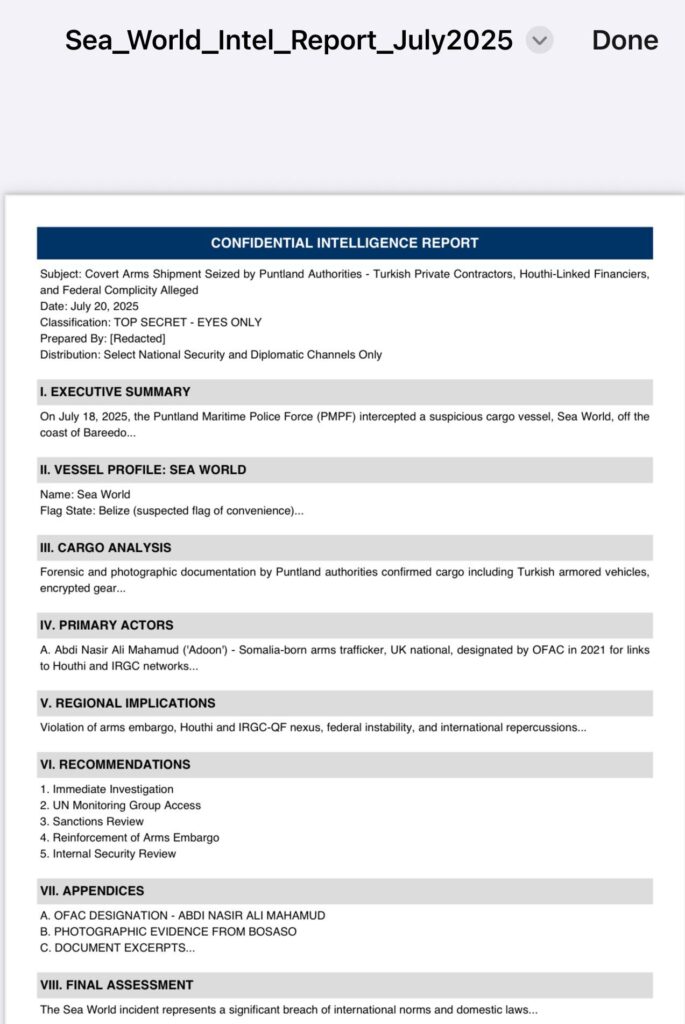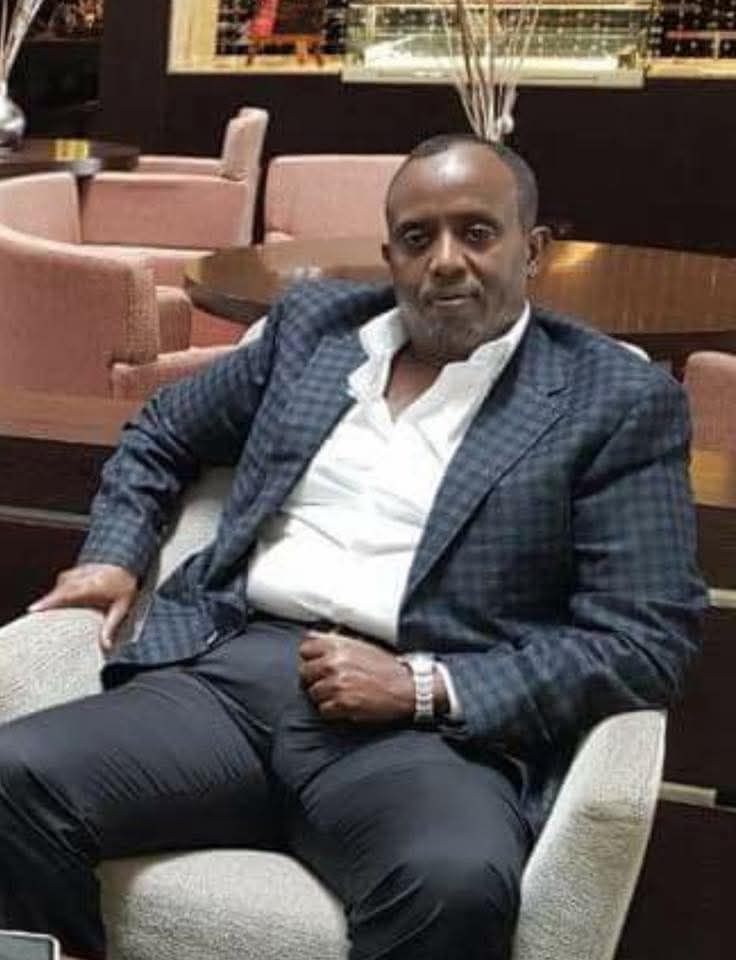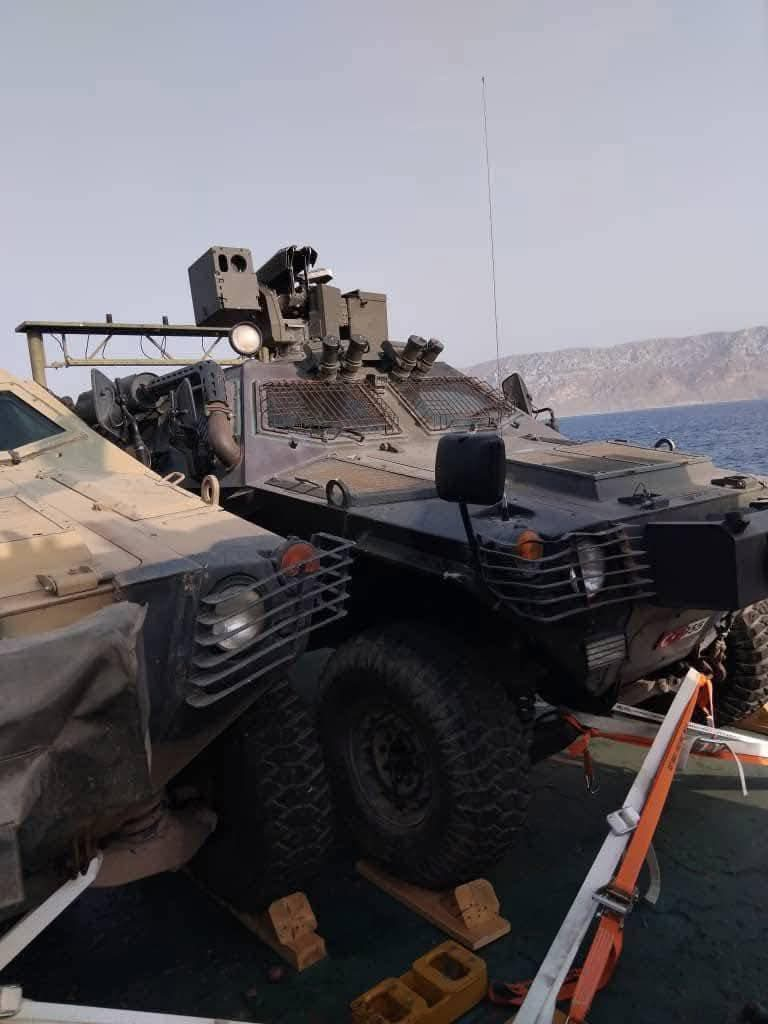Security Stakeholders, UN Sanctions Monitoring Group, AU Mission in Somalia, U.S. Department of State

Executive Summary
The seizure of the vessel Sea World by Puntland Maritime Police in mid-July 2025 has revealed a dangerous convergence of illicit arms trafficking, foreign private military involvement, and apparent complicity by senior officials within Somalia’s federal government. Intelligence gathered since the interception confirms that the vessel was operated by Turkish private military contractors and financed by Abdi Nasir Ali Mahamud (“Adoon”), a U.S.-sanctioned arms smuggler tied to both the Islamic Revolutionary Guard Corps-Quds Force (IRGC-QF) and the Houthi movement in Yemen.
While the Somali federal government has not issued any public statement regarding the incident, leaked manifests and intelligence briefings suggest the shipment was orchestrated without notifying Somali customs or the UN Security Council, in breach of existing arms control frameworks. The revelation has severe implications for Somalia’s fragile statehood, regional security, and the credibility of its international partnerships.
1. Background: Maritime Seizure in Puntland
On 18 July 2025, the Puntland Maritime Police Force (PMPF) intercepted the vessel Sea World near the port of Bareedo after local fishermen observed unusual offshore activity. A boarding operation uncovered a cargo of:
•Turkish-manufactured armored vehicles;
•Encrypted military-grade communication systems;
•Crates of Turkish and Iranian-marked small arms and ammunition;
•Documentation in Somali, Turkish, and Arabic.
The shipment lacked customs clearance and was not reported to the Somali Arms Management Mechanism (SAMM), thereby violating UN Security Council Resolution 2665 (2022).
2. Key Actors and Alleged Involvement

2.1 Abdi Nasir Ali Mahamud (“Adoon”)
•Nationality: British (Somali origin)
•Location: Resides in Turkey and UAE
•Designation: Listed by OFAC in 2021 for facilitating arms and oil smuggling for the IRGC-QF and the Houthis
•Role: Financier and logistics coordinator of the Sea World shipment
•Mechanism: Shell companies registered in Mersin (Turkey), Ajman (UAE), and Djibouti Free Zone
2.2 Turkish Private Military Companies (PMCs)
•Believed to operate under commercial cover linked to SADAT International
•Known for prior covert involvement in Libya, Azerbaijan, and parts of Sub-Saharan Africa
•Allegedly contracted by Somali officials with no parliamentary oversight
2.3 Somali Federal Officials (Alleged)
•President Hassan Sheikh Mohamud: Implicated in granting political cover for the shipment
•former Defense Minister Abdiqadir Mohamed Nur Jama: Alleged to have facilitated internal military coordination
•No official denial or clarification has been issued to date.
3. *Legal and Diplomatic Violations*
The incident represents multiple breaches of domestic and international law:
•Violation of the UN Arms Embargo: All arms shipments to Somalia must be reported to and approved by SAMM and the UN Sanctions Committee.
•Bypassing Federal Oversight Mechanisms: The Ministry of Defense did not inform Puntland or other federal institutions.
•Violation of International Sanctions: Use of a known OFAC-designated Houthi financier directly implicates Somalia in transnational arms smuggling tied to Iranian proxy networks.
4.Geopolitical Implications
4.1 Erosion of Federalism
The shipment entered Puntland territory without coordination, triggering institutional breakdowns between the Federal Government of Somalia (FGS) and Puntland. Garowe views this as a hostile act and breach of trust.
4.2 Regional Destabilization
The involvement of Houthi-linked networks in the Horn of Africa raises alarm.
Credit to G. MulMuli

